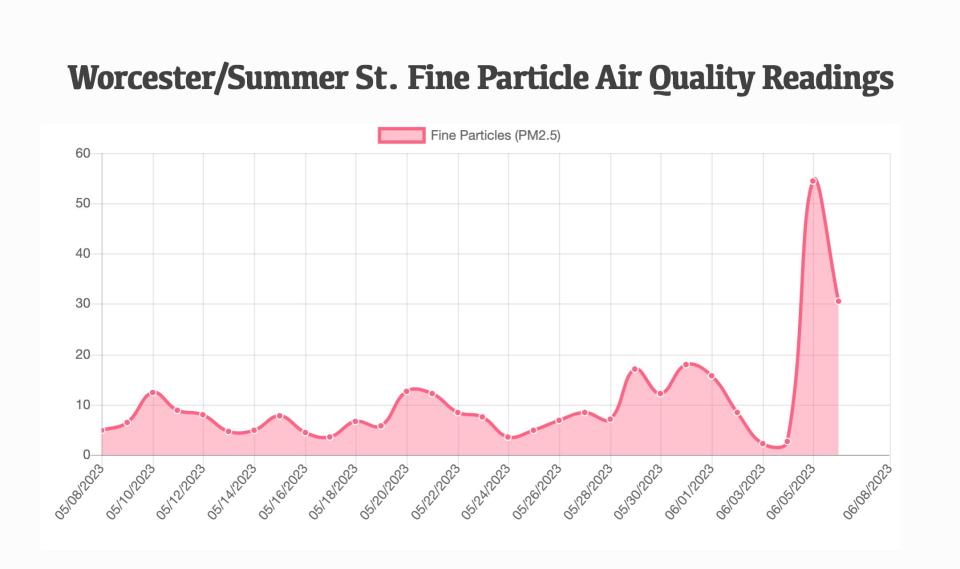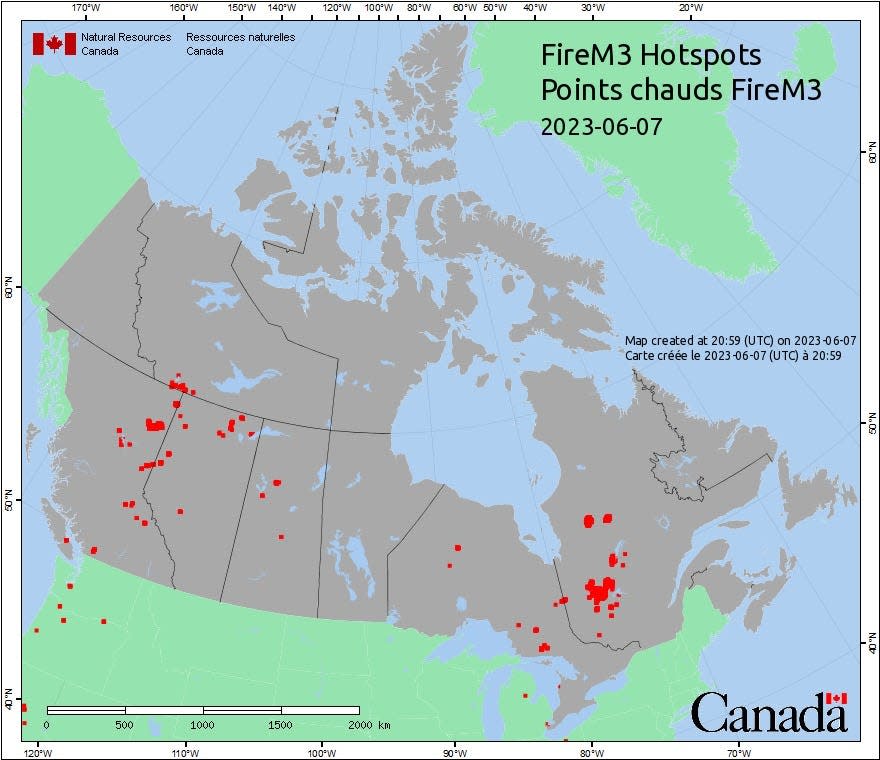Here's what you need to know to stay healthy as wildfire smoke descends on Worcester
WORCESTER – Worcester’s air quality improved Friday as winds took heavy smoke from Canadian wildfires to other parts of New England. Yet that situation could change on a dime.
Some scientists link climate change directly to the wildfires north of the border and predict they’re likely to become more frequent and severe in the weeks, months and years ahead.
The U.S. Environmental Protection Agency said as much on Thursday in a statement from an agency official.
“Many areas in New England are currently experiencing unhealthy air-quality levels due to smoke from wildfires in Canada,” said EPA New England Regional Administrator David Cash. “Scientists predict that the fire season in Canada will be longer and more intense as a result of climate change, so there is a chance we will see more of these kinds of events.”
Take fine-particle smoke health risks seriously
The danger is deceptive when the air doesn't seem heavily "smoggy."
Warnings from local, state and federal officials that smoke from wildfires can cause serious health problems should be taken seriously, especially for those with existing respiratory conditions. Often, you can't judge the risk just by looking outside.
Dr. Shahzad Khan, a pulmonologist at UMass Memorial Health, said people need to connect air quality with their health and any symptoms they might be feeling.
“Any time there is an increase in particulates in the atmosphere and they are inhaled, it can cause a flare-up or exacerbation of health problems,” Khan said.

Khan offered tips to remain safe whenever the smoke creeps from north of the border into Worcester:
Pay attention to air-quality alerts. Information is power, especially when it comes to your health.
Close windows at home to keep the smoke pollution out, especially on days when the air-quality level is low.
Use an air purifier, whenever possible.
If symptoms like coughing and wheezing become more severe, seek medical advice. Don’t put it off, because symptoms can escalate into bigger problems.
Asthma mixed with smoke: A problem in Worcester
Worcester has a preponderance of asthma sufferers, and that can be a dangerous situation when wildfire smoke blankets the city.
New England’s second-largest city ranked 11th nationally in 2021 for the most-challenging places to live with asthma, including prevalence, death rate and number of emergency room visits, according to a study done by the Asthma and Allergy Foundation of America.

Worcester's national asthma ranking improved in 2022, as it dropped down the list to the 63rd spot.
The U.S. Centers for Disease Control and Prevention recommends the following for those with asthma during periods of wildfire smoke:
Follow your health care provider’s advice and your asthma action plan, if you have one.
If you go to a shelter, make sure officials know you or your child has asthma.
After a wildfire, look out for any asthma symptoms. Contact your health care provider if you have trouble breathing, shortness of breath, a cough that won’t stop or other lingering symptoms. Also, call 911 or go immediately to an emergency department for medical emergencies.
Can wildfire smoke kill you? Yes
According to a study published by the National Institutes of Health, landscape fire smoke kills an average 339,000 people per year worldwide. Most of those fatalities happen in low-income areas.
The smoke also carries dangerous toxins.
"When you breathe air with wood smoke in it, you inhale the fine particles deeply into your lungs," the state of Washington explained in 2012 study about wood smoke. "The particles contain toxic substances that can remain in your lungs for months, causing changes that lead to diseases and structural damage."
Those particles in your lungs can be tiny – 2.5 microns or less, smaller than the diameter of a piece of human hair. Also, higher levels of fine particles in the air are associated with diseases and premature deaths, studies show.

"Larger and more frequent and intense wildfires are a growing public health problem, contributing to reduced air quality for people living near or downwind of fire," according to California Air Resources Board reports. "Health problems related to wildfire smoke exposure can be as mild as eye and respiratory tract irritation and as serious as worsening of heart and lung disease, including asthma, and even premature death."
Tips for using air purifier properly
As for Khan’s recommendation to invest in an air purifier, the Canadian government offered these reminders:
Keep your doors and windows closed.
Operate your air purifier in a room where you spend a lot of time, and use it at the highest setting. Operating at a lower setting may reduce the noise of the unit, but it will reduce its effectiveness.
Make sure your air purifier is sized appropriately for the largest room you will be using it in, and put it in a location where air flow will not be obstructed by walls, furniture or other objects in the room
Avoid blowing air directly at or between people in the room, and maintain the purifier by cleaning or replacing the filter as needed.
Reduce sources of indoor air pollution, such as smoking, vacuuming, burning incense or candles, using wood stoves and cleaning products that can emit high levels of volatile organic compounds.
The Telegram & Gazette is investigating the effects of a rapidly heating planet on people who live in our city. Follow along with "City on Fire" as we report the struggle with summer temperatures, even in New England. This is part of the USA TODAY project Perilous Course. Contact reporter Henry Schwan to be included in a story if you have been affected by heat: expense of air conditioning or lack of it, health risks, less access to green space, concern about pets and animals in the summer conditions, worry about an older loved one, etc.
Contact Henry Schwan at henry.schwan@telegram.com. Follow him on Twitter: @henrytelegram.
This article originally appeared on Telegram & Gazette: Worcester smoke in the air: Fine particles pose big health risk

